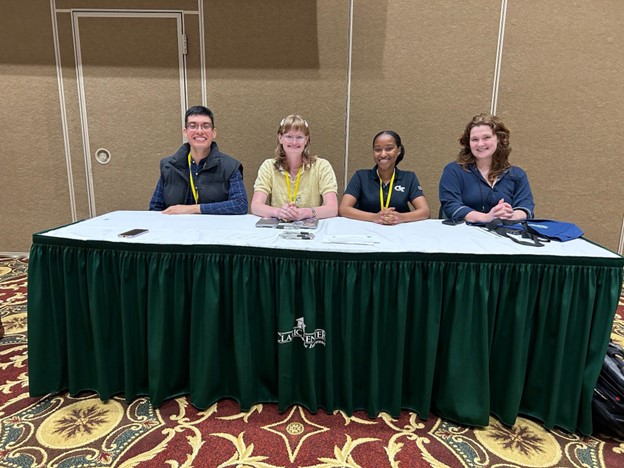Every year, the University System of Georgia (USG) Teaching and Learning Conference brings together educators and researchers from across Georgia to share their experiences and insights on innovative teaching methods that foster connections, strengthen learning, and create opportunities to support student success. This year, a group of students from the SLS-affiliated VIP course “Building for Equity and Sustainability” shared their perspectives on how the class’s innovative teaching methods can enhance students’ learning experience by helping them build community and fostering a sense of trust and belonging, which empowers them and lets them take control of their own learning .
The presentation explored how the VIP’s student-led team projects engaged and inspired students to develop meaningful connections with each other and with local communities. Lauren Riehm, an architecture student who has been in the VIP for two years, discussed the 5 Fundamentals of Equity in the Sustainable Built Environment, a student-generated framework which deeply embeds equity into the structure of the class. By providing students with more control over their projects, grading, and assignments, the 5 Fundamentals help build community through mutual, long-term mentorship within team settings and community partners. As a result, students become closer partners that must rely among one another and create a team environment they can trust and belong to.
Daraja Brown, third-semester VIP student in the civil engineering department, talked about the application of the 5 Fundamentals in the Rating Systems Team. The team has been working for many semesters to provide recommendations on how to make the equity component of the Living Building Challenge (LBC) certification more robust, comprehensive, and impactful, initially using the Kendeda Building as a model to study equity. Daraja focused on how the Rating Systems team uniquely positions students at the forefront of decision-making, helping students further their personal understanding of equity, which enables them to make meaningful recommendations to certifications, such as the LBC, that have wide-reaching, long term effect for many communities nationally and abroad.
Megan Jermak, also third-semester VIP student in the civil engineering department, focused on her team’s work with the West Atlanta Watershed Alliance (WAWA). By working closely with a community partner, students can explore and learn how to implement equity and sustainability projects in the real world. Through a series of community engagement projects, the VIP empowers and teaches students how to merge their engineering and technical skills with outreach and engagement, which is entirely hands-on. As many students are working with a community stakeholder for the first time, they are exposed to a much needed approach that listens to people and helps break built trust and belonging between higher education institutions and surrounding local communities.
As the VIP’s graduate teaching assistant, Miguel Jimenez, a third year dual architecture and city planning student, talked about the impact of equity and community on teaching. He emphasized how instructors must be creative and innovative in their teaching methods in order to find ways to help students achieve work-life balance and a healthy learning environment. Miguel also talked about how instructors must listen and collaborate with local organizations as well as students themselves to provide anyone who wants to learn access to resources and support that can help them succeed academically and personally. A major takeaway in his discussion was that equity and community requires that instruction is culturally responsive to the diverse backgrounds and experiences of all students, meaning that teachers must be aware of and respect the cultural norms and values of their students in order to create an inclusive learning environment that values diversity.
At the end of the presentation, the four students led a workshop. They guided group discussions and an activity to help the attendees think and reflect on teachable takeaways to incorporate equity and foster community in their own courses using the 5 Fundamental framework Drawing on their own experiences as students, the presenters ultimately emphasized the importance of incorporating innovative teaching methods into the classroom and shared practical tips and strategies for doing so.
The student-led presentation was met with enthusiasm from the audience, who were impressed by the insights and knowledge demonstrated by the presenters. Their unique analysis of innovative teaching methods from a student-perspective stressed the importance of listening to and incorporating student perspectives into discussions of teaching and learning. Overall, the presentation at the USG Teaching and Learning Conference served as a reminder of the valuable contributions that students can make to discussions of pedagogy and teaching practice. By centering student voices and perspectives, educators can create more dynamic, engaging, and effective learning experiences for all students that are rooted in equity and sustainability.

The views and opinions expressed in this article are solely those of the author(s) and do not necessarily reflect the views of the Georgia Institute of Technology, the University System of Georgia, or the Board of Regents of the University System of Georgia.
